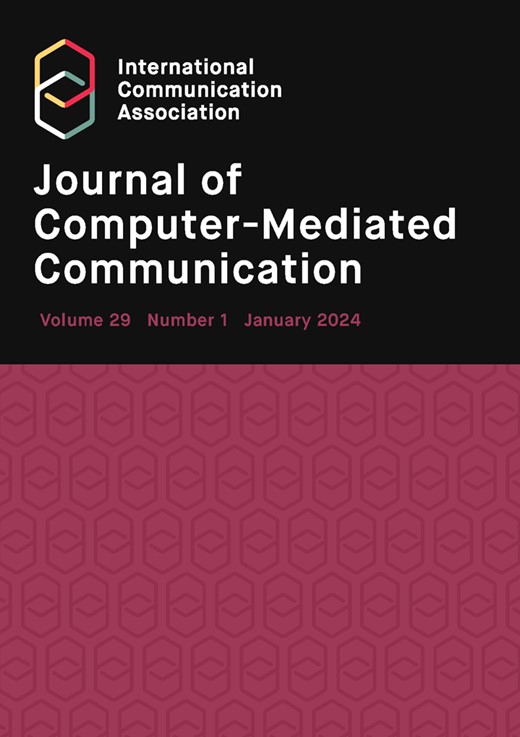数字脱节、数字不平等和主观幸福感:移动体验抽样研究
IF 5.7
1区 文学
Q1 COMMUNICATION
引用次数: 0
摘要
根据数字媒体(非)使用和幸福感的理论,本研究探讨了自愿断开与主观幸福感的关系,以及数字技能在这种关系中扮演的角色。我们依靠移动体验抽样方法,将一天中细微的断开连接行为(例如,把屏幕设备放在一边,把通知静音)与短暂的健康体验联系起来。在一周的时间里,我们从105个移动媒体用户那里收集了4028份回复。多水平回归分析显示,断网对情感幸福感、社会联系或生活满意度没有显著的个人影响,也没有显著的数字技能调节效应。然而,探索性分析表明,断开对参与者幸福感的影响差异很大,而这种影响取决于一个人是否与他人的物理存在断开。我们的研究为数字时代故意不使用技术的后果(或缺乏后果)提供了一个精细的视角。本文章由计算机程序翻译,如有差异,请以英文原文为准。
Digital disconnection, digital inequality, and subjective well-being: a mobile experience sampling study
Abstract Drawing on theories of digital media (non-)use and well-being, this study examines how voluntary disconnection relates to subjective well-being and what role digital skills play in this relationship. We rely on mobile experience sampling methods to link nuanced disconnection practices throughout the day (e.g., putting screen devices away and muting notifications) with momentary experiences of well-being. We collected 4,028 responses from 105 mobile media users over the course of one week. Multilevel regression analyses revealed neither significant within-person effects of disconnection on affective well-being, social connectedness, or life satisfaction, nor a significant moderation effect of digital skills. Exploratory analyses, however, show that effects of disconnection on well-being vary greatly across participants, and that effects are dependent on whether one disconnects in the physical copresence of others. Our study offers a refined perspective on the consequences, or lack thereof, of deliberate non-use of technology in the digital age.
求助全文
通过发布文献求助,成功后即可免费获取论文全文。
去求助
来源期刊
CiteScore
9.60
自引率
2.80%
发文量
26
期刊介绍:
The Journal of Computer-Mediated Communication (JCMC) has been a longstanding contributor to the field of computer-mediated communication research. Since its inception in 1995, it has been a pioneer in web-based, peer-reviewed scholarly publications. JCMC encourages interdisciplinary research, welcoming contributions from various disciplines, such as communication, business, education, political science, sociology, psychology, media studies, and information science. The journal's commitment to open access and high-quality standards has solidified its status as a reputable source for scholars exploring the dynamics of communication in the digital age.

 求助内容:
求助内容: 应助结果提醒方式:
应助结果提醒方式:


